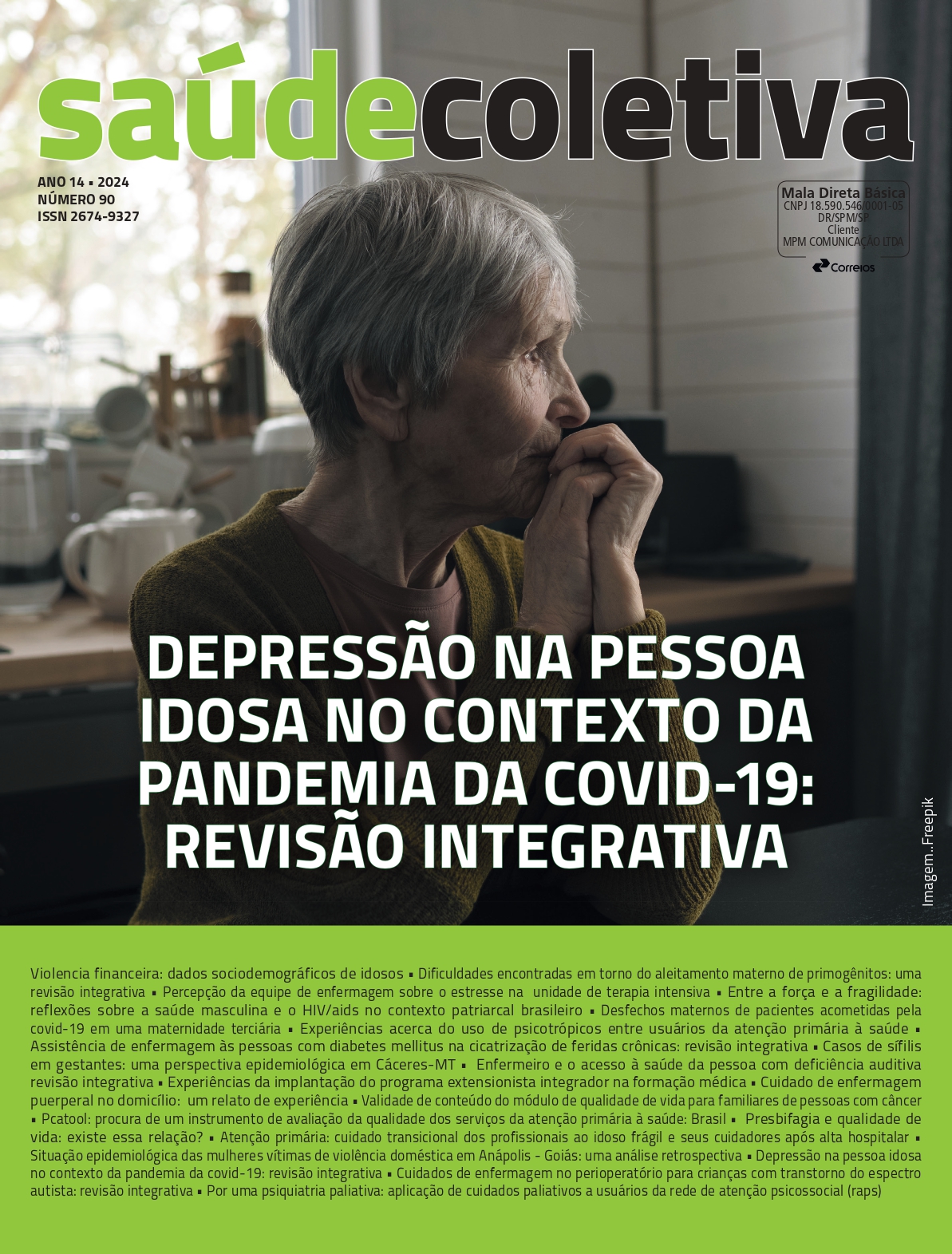CHALLENGES IN BIRTH ASSISTANCE FOR WOMEN WITH DISABILITIES: AN INTEGRATIVE REVIEW
DOI:
https://doi.org/10.36489/saudecoletiva.2024v14i90p13405-13411Keywords:
Women's health, Obstetric Birth, Obstetric Violence, Disabled people, ChildbirthAbstract
Objective: to identify the limitations faced in providing birth assistance to women with disabilities. Methodology: this is an integrative review of the literature. The collection of scientific production data was consolidated in October 2023, by two independent reviewers and in research carried out in the MEDLINE, LILACS, BDENF, IBECS AND CUMED databases. Results: 50 articles were obtained in the library search, and after applying the inclusion and exclusion criteria, 6 articles were selected. It highlighted challenges in providing birth assistance to women with disabilities, as care providers for this social segment demonstrated that they lack experience, in addition to the lack of guidance during prenatal care and inappropriate environments also contribute to this scenario. Conclusion: it is noted that women with disabilities have their sexuality and reproduction permeated by economic, physical, communicational and attitudinal barriers. Thus, these limitations influence the promotion of inadequate and unsafe assistance.
References
Tarasoff LA, Ravindran S, Malik H, Salaeva D, Brown HK. Maternal disability and risk for pregnancy, delivery, and postpartum complications: a systematic review and meta-analysis. American Journal of Obstetrics and Gynecology. 2020, 222(1) 1–32. doi: https://doi.org/10.1016/j.ajog.2019.07.015
Brasil. Constituição (1988). Constituição da República Federativa do Brasil. Brasília, DF: Senado Federal;1988. Available from: https://www.planalto.gov.br/ccivil_03/constituicao/constituicao.htm
Thomaz EBAF, Costa EM, Goiabeira YNLA, Rocha TAH, Rocha NCS, Marques MCO, et al. Acessibilidade no parto e nascimento a pessoas com deficiência motora, visual ou auditiva: estrutura de estabelecimentos do SUS vinculados à Rede Cegonha. Ciência & Saúde Coletiva. 2021, 26(3), 897–908. doi: https://doi.org/10.1590/1413-81232021263.17582020
Dommergues M, Candilis D, Becerra L, Thoueille E, Cohen D, Viaux-Savelon S. Childbirth and motherhood in women with motor disability due to a rare condition: an exploratory study. Orphanet Journal of Rare Diseases. 2021,16(1) 1-10. doi: https://doi.org/10.1186/s13023-021-01810-8
Commodari E, Lucia La Rosa V, Nania SG. Pregnancy, Motherhood and Partner Support in Visually Impaired Women: A Qualitative Study. International Journal of Environmental Research and Public Health. 2022,19(7), 1- 3. doi: https://doi.org/10.3390/ijerph19074308
Hall J, Hundley V, Collins B, Ireland J. Dignity and respect during pregnancy and childbirth: a survey of the experience of disabled women. BMC Pregnancy and Childbirth. 2018,18(1), 1-13. doi: https://doi.org/10.1186/s12884-018-1950-7
Corrêa VCR, Jurdi APS, Silva CCB. Mães com Deficiência e Maternidade: Cotidiano, Redes de Apoio e Relação com a Escola. Revista brasileira de educação especial. 2022, 28(e0159), 335-348. doi: https://doi.org/10.1590/1980-54702022v28e0159
Devkota HR, Kett M, Groce N. Societal attitude and behaviours towards women with disabilities in rural Nepal: pregnancy, childbirth and motherhood. BMC Pregnancy and Childbirth. 2019, 19(1). doi: https://doi.org/10.1186/s12884-019-2171-4
Morais FRC, Constancio DF, Costa LML, Moreira MCN. As mulheres com deficiência e a experiência da maternidade: protocolo de revisão de escopo. ResearchGate. Research, Society and Development. 2022, 11(4), p. 1-8. doi: https://doi.org/10.33448/rsd-v11i4.26755
Souza MT, Silva MD, Carvalho R. Integrative review: what is it? How to do it?. Einstein. 2010, 8(1): 102-106. doi: https://doi.org/10.1590/S1679-45082010RW1134
Mendes KDS, Silveira RCCP, Galvão CM. Revisão integrativa: método de pesquisa para a incorporação de evidências na saúde e na enfermagem. Texto & Contexto Enfermagem. 2008, 7(4):758–64. doi: https://doi.org/10.1590/S0104-07072008000400018
Page MJ, Mckenzie JE, Bossuyt PM, Boutron I, Hoffmann TC, Murlrow C, et al. The PRISMA 2020 statement: an updated guideline for reporting systematic reviews. 2021, 88 (71): 1-9. doi: https://doi.org/10.1016/j.ijsu.2021.105906
Wudneh A, Cherinet A, Abebe M, Bayisa Y, Mengistu N, Molla W. Obstetric violence and disability overlaps: obstetric violence during child birth among womens with disabilities: a qualitative study. Journal BMC Womens Health. 2022, 22(299) 1-13. doi: https://doi.org/10.1186/s12905-022-01883-y
Brown HK, Kirkham YA, Cobigo V, Lunsky Y, Vigod SN. Labour and delivery interventions in women with intellectual and developmental disabilities: a population-based cohort study. J Epidemiol Community Health. 2016, 70 (3) 238-244. doi: https://doi.org/10.1136/jech-2015-206426
Lim NG, Lee JY, Park JO, Lee JA, Oh J. Pregnancy, prenatal care, and delivery of mothers with disabilities in Korea. J Korean Med Sci. 2015,30(2) 127–32. doi: https://doi.org/10.3346/jkms.2015.30.2.127
Long-Bellil L, Mitra M, Iezzoni LI, Smeltzer SC, Smith L. The Impact of Physical Disability on Pregnancy and Childbirth. J Womens Health (Larchmt). 2017, 26(8) 878–85. doi: https://doi.org/10.1089/jwh.2016.6157
Smeltzer SC, Wint AJ, Ecker JL, Iezzoni LI. Labor, delivery, and anesthesia experiences of women with physical disability. Birth. 2017,44(4) 315 – 24. doi: https://doi.org/10.1111/birt.12296
Walsh-Gallagher D, Conkey RM, Sinclair M, Clarke R. Normalising birth for women with a disability: the challenges facing practitioners. Midwifery. Journal Elsevier. 2011, 29 (2013) 294–9. doi: https://doi.org/10.1016/j.midw.2011.10.007
O’Brien KE, Rosen MW, Ernst SD. Obstetric and Gynecologic Care for Individuals with Disabilities. Obstetrics and Gynecology Clinics of North America. 2023,51(1) 43-56. doi: https://doi.org/10.1016/j.ogc.2023.10.002
Katz L, Amorim MM, Giordano JC, Bastos MH, Brilhante AVM. Who is afraid of obstetric violence? Revista Brasileira de Saúde Materno Infantil. 2020,20(2):623–6. doi:•https://doi.org/10.1590/1806-93042020000200017
Horner-Johnso W, Darney BG, Biel FM, Caughey AB. Prolonged postpartum length of hospital stay among women with disabilities. Disability and Health Journal. 2020, 13(4) 1-6. doi: https://doi.org/10.1016/j.dhjo.2020.100934
Shin JE, Cho GJ, Bak S, Won SE, Han SW, Lee SB, et al. Pregnancy and neonatal outcomes of women with disabilities: a nationwide population-based study in South Korea. Scientific Reports. 2020, 10 (1). doi: https://doi.org/10.1038/s41598-020-66181-9
Becker H, Andrews E, Walker LO, Phillips CS. Health and Well-Being among Women with Physical Disabilities After Childbirth: An Exploratory Study. Women’s Health Issues. 2021,31(2):140–7. doi: https://doi.org/10.1016/j.whi.2020.10.007
Nguyen TV, King J, Edwards N, Dunne MP. Whose decision? Caesarean section and women with physical disabilities in Northern Vietnam: A qualitative study. Midwifery. 2022,104:103175. doi:https://doi.org/10.1016/j.midw.2021.103175







